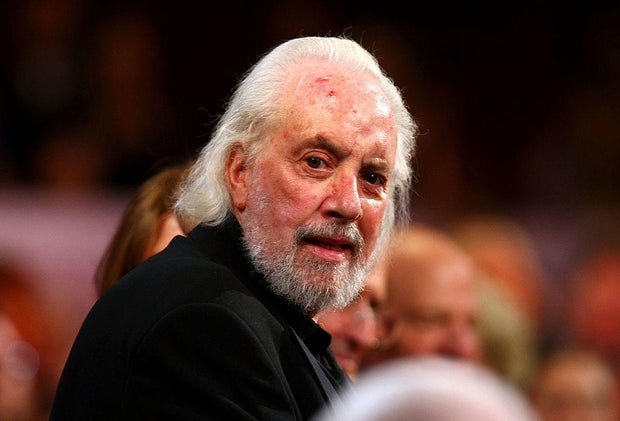CBS News
How a home equity loan may help reduce your tax burden

Getty Images
Tax season is in full swing. At this point, you’ve likely received your W2s, 1099s and any other tax documents that you need to file your taxes.
And, you may have started to think about the deductions you’ll be able to take on this year’s return, too. After all, the more deductions you can take, the better your tax bill is likely to be.
But did you know that if you’ve recently taken out a home equity loan, you may qualify for even more deductions? And, if you take out a new home equity loan this year, you may be able to substantially reduce your 2024 tax burden when it’s time to file next year.
Compare your home equity loan options today.
How a home equity loan may help reduce your tax burden
“Home equity loans are commonly used to consolidate high interest debt or make home improvements on a homeowner’s existing residence,” says Bill Banfield, executive vice president of capital markets at Rocket Mortgage. “What people might not know is that home equity loan interest can be tax deductible, depending on how the funds are used and the specific conditions set by the IRS.”
So, how can you make sure that your home equity loan interest is tax-deductible? And are there other ways home equity loans can bolster your tax refund? Here are a few tax advantages you could get with your home equity loan:
Tax deductions for home improvements
“Interest on a home equity loan is tax deductible if the money is used on renovations that substantially improve the home,” says Banfield.
So, if you use the money you borrow with a home equity loan to improve your home, you may be able to write off the interest you pay on the loan as a tax deduction. However, there is a caveat:
“In order to be deductible, the money must be spent on the property from which the equity loan is sourced,” says Banfield.
In other words, you won’t be able to write off your home equity loan interest if you take the loan out on your primary residence and use it to renovate your vacation home.
Get the most out of your tax deductions with TurboTax.
Tax deductions for building or purchasing a new home
Home renovations aren’t the only way to reap the tax benefits of a home equity loan.
“Interest incurred on a home equity loan can be deductible on the taxpayer’s Schedule A of the 1040,” says Paul T. Joseph, attorney, CPA and founder of Joseph & Joseph Tax & Payroll. “The proceeds from the loan must be used to either purchase a home, build a home or make improvements to your existing home.”
So, if you use a home equity loan to purchase or build a new home, you should be able to deduct the loan’s interest on your tax return.
Tax deductions for energy-efficient upgrades
Those aren’t the only way to enjoy tax benefits associated with a home equity loan.
The United States tax code includes several write-offs for energy-efficient home upgrades. For example, you may be able to access additional tax credits for installing energy-efficient windows and doors, improving your home’s insulation and more. You may also be eligible for a tax credit worth up to 30% of the cost of a new solar system as long as you install it before 2032, according to the U.S. Department of Energy.
So, when you use your home equity loan to make energy-efficient renovations to your home, you could take advantage of multiple incentives: your home equity loan interest deduction and your energy efficiency-related tax credits.
The bottom line
Your home equity loan could be a secret weapon in your effort to reduce your tax burden. If you’ve already taken out your loan, consider how you used the money and whether you’ll be able to take advantage of the tax benefits mentioned above. If you plan on taking out a home equity loan soon, consider using the money you receive in a tax-advantaged way to bolster your tax return in the next filing season.
CBS News
7/2: CBS Evening News – CBS News

Watch CBS News
Be the first to know
Get browser notifications for breaking news, live events, and exclusive reporting.
CBS News
Robert Towne, legendary Hollywood screenwriter of “Chinatown,” dies at 89

Robert Towne, the Oscar-winning screenplay writer of “Shampoo,” “The Last Detail” and other acclaimed films whose work on “Chinatown” became a model of the art form and helped define the jaded allure of his native Los Angeles, has died. He was 89.
Towne “passed away peacefully surrounded by his loving family” Monday at his home in Los Angeles, his publicist Carri McClure, told CBS News in a statement. She did not provide a cause of death.
In an industry which gave birth to rueful jokes about the writer’s status, Towne for a time held prestige comparable to the actors and directors he worked with. Through his friendships with two of the biggest stars of the 1960s and ’70s, Warren Beatty and Jack Nicholson, he wrote or co-wrote some of the signature films of an era when artists held an unusual level of creative control. The rare “auteur” among screen writers, Towne managed to bring a highly personal and influential vision of Los Angeles onto the screen.
Alberto E. Rodriguez/Getty Images for AFI
“It’s a city that’s so illusory,” Towne told The Associated Press in a 2006 interview. “It’s the westernmost west of America. It’s a sort of place of last resort. It’s a place where, in a word, people go to make their dreams come true. And they’re forever disappointed.”
Recognizable around Hollywood for his high forehead and full beard, Towne won an Academy Award for “Chinatown” and was nominated three other times, for “The Last Detail,” “Shampoo” and “Greystoke.” In 1997, he received a lifetime achievement award from the Writers Guild of America.
“His life, like the characters he created, was incisive, iconoclastic and entirely (original),” said “Shampoo” actor Lee Grant on X.
Towne was born Robert Bertram Schwartz in Los Angeles and moved to San Pedro after his father’s business, a dress shop, closed down because of the Great Depression. His father changed the family name to Towne.
Towne’s success came after a long stretch of working in television, including “The Man from U.N.C.L.E” and “The Lloyd Bridges Show,” and on low-budget movies for “B” producer Roger Corman. In a classic show business story, he owed his breakthrough in part to his psychiatrist, through whom he met Beatty, a fellow patient. As Beatty worked on “Bonnie and Clyde,” he brought in Towne for revisions of the Robert Benton-David Newman script and had him on the set while the movie was filmed in Texas.
Towne’s contributions were uncredited for “Bonnie and Clyde,” the landmark crime film released in 1967, and for years he was a favorite ghost writer. He helped out on “The Godfather,” “The Parallax View” and “Heaven Can Wait” among others and referred to himself as a “relief pitcher who could come in for an inning, not pitch the whole game.” But Towne was credited by name for Nicholson’s macho “The Last Detail” and Beatty’s sex comedy “Shampoo” and was immortalized by “Chinatown,” the 1974 thriller set during the Great Depression.
“Chinatown” was directed by Roman Polanski and starred Nicholson as J.J. “Jake” Gittes, a private detective asked to follow the husband of Evelyn Mulwray (played by Faye Dunaway). The husband is chief engineer of the Los Angeles Department of Water and Power and Gittes finds himself caught in a chaotic spiral of corruption and violence, embodied by Evelyn’s ruthless father, Noah Cross (John Huston).
Influenced by the fiction of Raymond Chandler, Towne resurrected the menace and mood of a classic Los Angeles film noir, but cast Gittes’ labyrinthine odyssey across a grander and more insidious portrait of Southern California. Clues accumulate into a timeless detective tale, and lead helplessly to tragedy, summed up by one of the most repeated lines in movie history, words of grim fatalism a devastated Gittes receives from his partner Lawrence Walsh (Joe Mantell): “Forget it, Jake, it’s Chinatown.”
The back story of “Chinatown” has itself become a kind of detective story, explored in producer Robert Evans’ memoir, “The Kid Stays in the Picture”; in Peter Biskind’s “East Riders, Raging Bulls,” a history of 1960s-1970s Hollywood, and in Sam Wasson’s “The Big Goodbye,” dedicated entirely to “Chinatown.” In “The Big Goodbye,” published in 2020, Wasson alleged that Towne was helped extensively by a ghost writer — former college roommate Edward Taylor. According to “The Big Goodbye,” for which Towne declined to be interviewed, Taylor did not ask for credit on the film because his “friendship with Robert” mattered more.
The studios assumed more power after the mid-1970s and Towne’s standing declined. His own efforts at directing, including “Personal Best” and “Tequila Sunrise,” had mixed results. “The Two Jakes,” the long-awaited sequel to “Chinatown,” was a commercial and critical disappointment when released in 1990 and led to a temporary estrangement between Towne and Nicholson.
Around the same time, he agreed to work on a movie far removed from the art-house aspirations of the ’70s, the Don Simpson-Jerry Bruckheimer production “Days of Thunder,” starring Tom Cruise as a race car driver and Robert Duvall as his crew chief. The 1990 movie was famously over budget and mostly panned, although its admirers include Quentin Tarantino and countless racing fans. And Towne’s script popularized an expression used by Duvall after Cruise complains another car slammed him: “He didn’t slam into you, he didn’t bump you, he didn’t nudge you. He rubbed you.
“And rubbin,′ son, is racin.'”
Towne later worked with Cruise on “The Firm” and the first two “Mission: Impossible” movies. His most recent film was “Ask the Dust,” a Los Angeles story he wrote and directed that came out in 2006. Towne was married twice, the second time to Luisa Gaule, and had two children. His brother, Roger Towne, also wrote screenplays, his credits include “The Natural.”
CBS News
Analyzing impact of Supreme Court’s Trump immunity decision

Watch CBS News
Be the first to know
Get browser notifications for breaking news, live events, and exclusive reporting.





